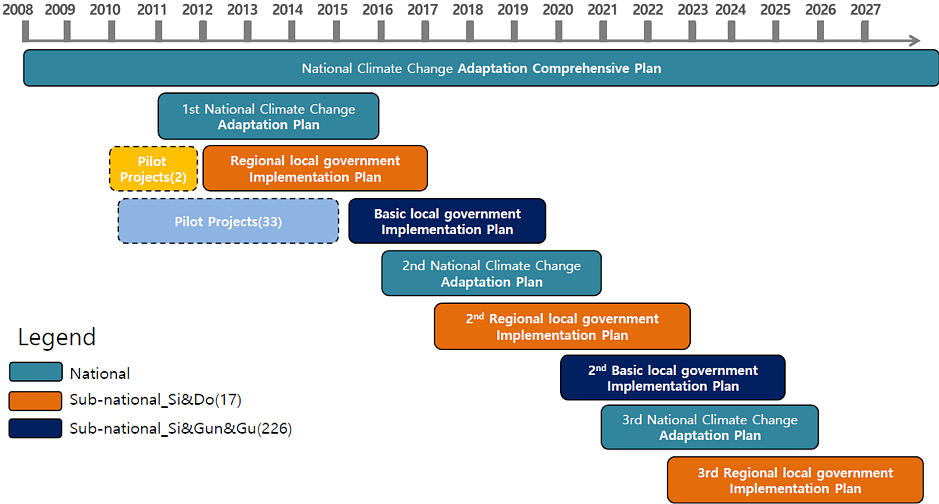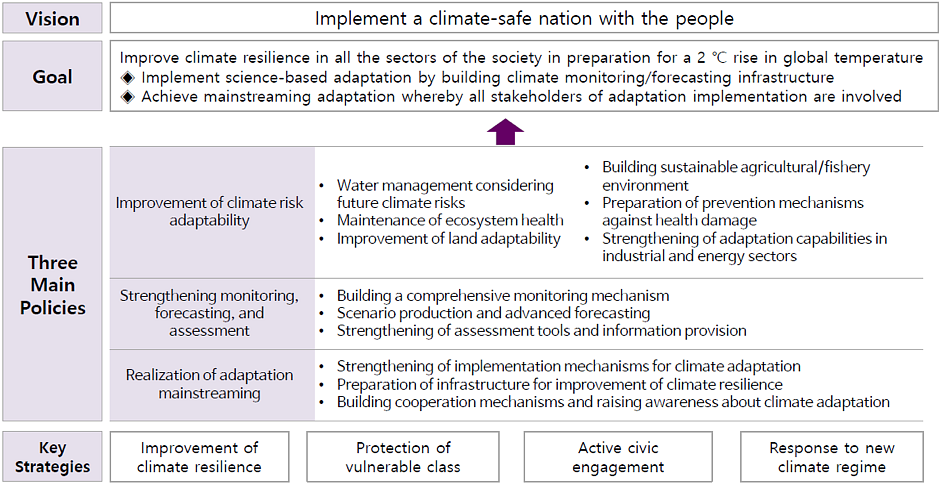Forging new collaborations with the Korea Adaptation Centre for Climate Change
Guest blog from, Dr YoungHwa Cha, Postdoctoral Research Associate in Climate Stress at the University of Edinburgh. Dr Cha is an expert in land use planning and climate change adaptation. She has developed her expertise in adaptation practice and policy, which both require interdisciplinary approaches, and has worked with ECCI and the Korean Adaptation Centre for Climate Change in the Korean Environment Institute.
We are facing a global climate crisis and we need to adapt to severe adverse weather events and natural hazards that we are facing. For adaptation to be successful we need to share our knowledge and skills.
With this in mind, ECCI recently hosted a special guest speaker, Dr JiYoung Shin, from the Korea Adaptation Centre for Climate Change (KACCC) to share their experience, tools and knowledge on adaptation with the ECCI Adaptation Community of Practice (Adaptation CoP).
The Adaptation Community of Practice brings together researchers, students and practitioners across the School of GeoSciences and ECCI community to share current thinking and practice on adaptation including risk and resilience.
The Adaptation CoP were able to learn and discuss similar challenges in developing practical decision-making supporting tools for modelling risks and assessing vulnerabilities to utilise around stakeholders. The discussion also highlighted the true meaning of policy progress based on self-assessments concerned with improving the procedure and criteria of monitoring and evaluating to show a more realistic and transparent climate change adaptation (CCA) policy implementation.
We hope this marks the start of a new partnership to continue knowledge exchanges and seek future opportunities to forge new collaboration between ECCI and KACCC.
Korea Adaptation Centre for Climate Change (KACCC)
Dr JiYoung Shin is the director of Korea Adaptation Centre for Climate Change (KACCC) and a senior research fellow at the Korea Environment Institute (KEI). She is an expert in environmental ecology planning and climate change adaptation (CCA) policymaking and implementation. As KACCC is the leading institute for the national CCA under the Ministry of Environment (the ministry-in-charge of climate change adaption), she participated in and directed the national CCA strategies (5-year cycle), action plans and monitoring and evaluating of CCA progress.
In July 2009, KACCC was consigned to the KEI where the institution is the key environmental research and policy interface think-tank under the Office of Prime Minister in Korea since 1992. KACCC achieved outstanding research outcomes, successful coordination across sectors, government ministries, and local authorities, and active engagements with the public including domestic and international communities.
The key features of KACCC available in English are:
- Support major adaptation groups: Climate Change Risk Assessment system to build Business Adaptation Plan (CRAS)
- Publication of Adaptation Newsletter biannually since 2011
- Development of the Korean climate change vulnerability assessment tool (VESTAP)
Adaptation Policy Setting in South Korea
While climate change response strategies in South Korea have only focused on mitigation since 1999, the first CCA strategy “National Climate Change Adaptation Comprehensive Plan 2019-2030” was launched in 2008. The official “National Climate Change Adaptation Plan 2011-2015” (NAP) launched in 2011 with the update of strategy including concrete CCA related projects across 10 sectors under the Low Carbon and Green Growth Act (April 2010) and the implementation plans in following years (see below). Also, the Act enabled KACCC to coordinate and support launching plans and monitoring & evaluating (M&E) implementation plans together across the related government ministries and local authorities.

The 3rd round of NAP 2021-2025 was launched this year and reflected the change of regulation that the Carbon-Neutral Framework Act (March 2022) is replacing Low Carbon and Green Growth Act (April 2010).
What changes for Adaptation under the Carbon-Neutral Framework Act?
The Carbon-Neutral Framework Act includes eight provisions to accelerate adaptation compared to one planning duty in the previous Act. Newly added duties fall into strengthening and accelerating CCA implementation with extended policy tools to enhance more inclusive and practical mainstreaming (see below). For example, CCA progress M&E will be extended to all public bodies’ duties and invite 50 civic to the M&E committee of CCA implementation plans. Furthermore, the new Act enforces the Strategic Environmental Impact Assessment to include the climate change impact assessment.

The Adaptation Community of Practice
The Adaptation Community of Practice (Adaptation CoP) brings together researchers, students and practitioners across the School of GeoSciences and the ECCI community to share current thinking and practice on adaptation including risk and resilience. Since February 2021, the group meets on the last Thursday of every month.
For the further details please contact: Dr YoungHwa Cha (younghwa.cha@ed.ac.uk) about Korean CCA or Dr Kate Crowley (kate.crowley@ed.ac.uk) for Adaptation CoP meeting.